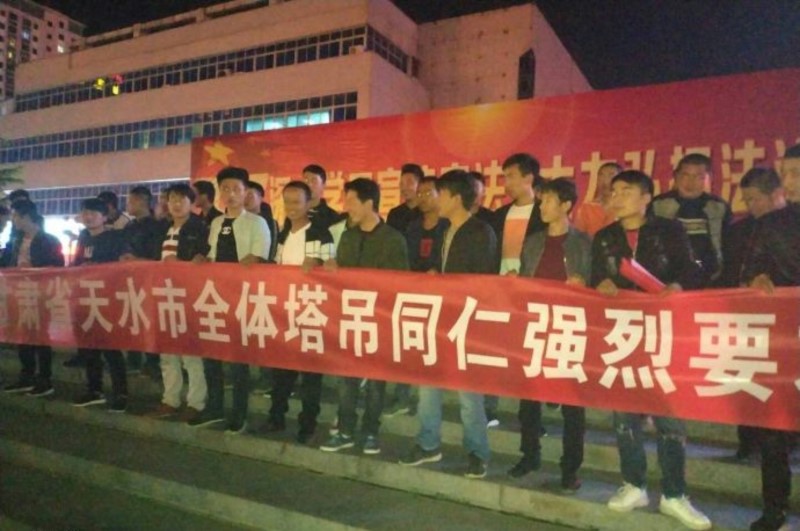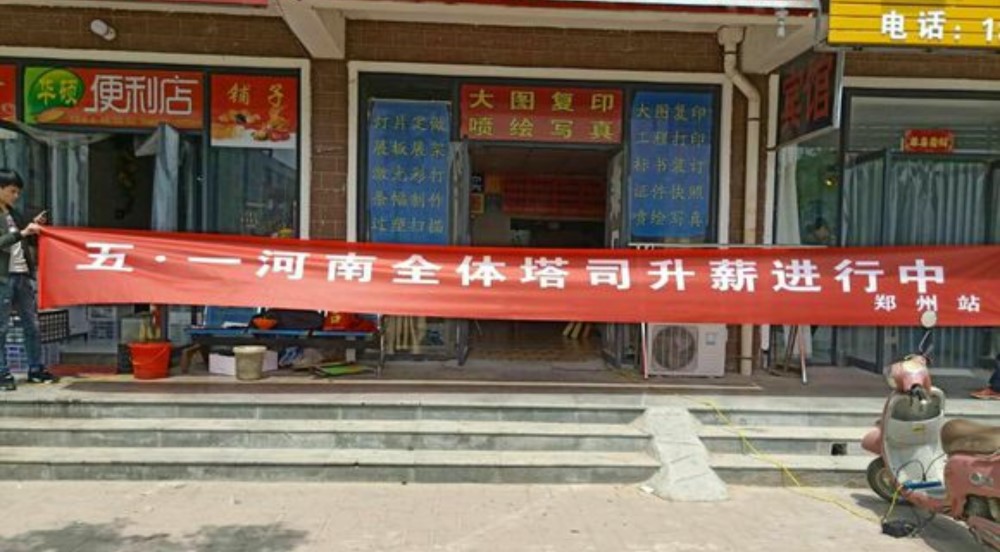Tower crane operators across China organise Labour Day strike over low pay
02 May 2018Tower crane operators have been staging protests across China over the last week and yesterday organised a remarkable nationwide strike demanding better pay and working conditions.
China Labour Bulletin’s Strike Map has recorded at least a dozen strikes and protests since 25 April, including incidents in Sichuan, Gansu, Henan, Fujian, Hunan, Jiangsu, Guizhou, Jiangxi, Hubei and Guangxi.

Crane operators stage protest in Tianshui, Gansu
China’s Party-affiliated media outlet the Global Times reported yesterday that “crane operators protested across China during Labour Day demanding better pay and an eight-hour working day.” It quoted one worker as saying, "There are at least 10,000 crane operators in Chengdu appealing for a salary raise."
Reporting on what could be the largest sectoral labour dispute in China in recent years, Hong Kong’s Cable News said that there had been “worker protests demanding a salary raise and improved labour conditions at construction sites and public spaces in 20 to 30 cities.”
Workers’ demands included salary increases to compensate for inflation, increased overtime payments, formal labour contracts, regular monthly wage payments, set working hours and paid holidays, and payment of social insurance and pension contributions.
“We work 12 hours a day on average, often until late at night or overnight with no overtime compensation, we have no social insurance, no labour contracts and go without government supervision,” claimed “Uncle Young” in a collection of worker testimonies published by Epoch Pioneer.
The crane operators claim that they’ve been making just 4,000 and 5,000 yuan per month for the last decade and are demanding at least 7,000 yuan per month. The workers stressed that they should be paid more than ordinary construction workers because of their harsh, high-pressure working environment: high temperatures and long shifts with no toilet breaks inside high-altitude cabins, and the constant psychological pressure of transporting heavy construction materials that could potentially cause fatalities. The salary increase proposed by the crane operators is a comprehensive structure that differentiates pay levels according to experience and type of work.
The workers organised online via closed groups on instant messaging apps like QQ to discuss strategies and make announcements. After going through an identity screening process and paying membership fees, members had to follow a series of rules issued by group administrators: for example, in an apparent effort to strengthen solidarity, nobody was allowed to publish recruitment advertisements inside these groups in the days leading up to the Labour Day strike. They also published videos and songs on public forums to gain wider support and solidarity.

May Day protest in Henan
In one Weibo post (now deleted by the censors but recorded on CLB’s Strike Map) “Joseph Deng Yuxiang” in Sichuan argued that, “The union should have organised this strike, that would have been the best way to guarantee that the interests of all parties are protected.” Union engagement with workers and management “would have been the most efficient approach.” Deng noted but added that “the union would just not acknowledge its responsibility.”
CLB’s Executive Director Han Dongfang, followed up Deng’s comments by suggesting:
Tower crane operators have extended an open invitation to the official union. Now it’s the union’s turn to move on from taking on worker grievances when violations of labour law occur and instead to truly represent workers when there’s a collective demand for better working conditions.
So far, the response of the authorities to the crane operators’ social media campaign, protests and strikes has been heavy-handed censorship online and police pressure offline.
However, there is, as Han noted, an opportunity for the official trade union to play a positive role. Especially, as the Global Times noted: “China since March has been encouraging more truck drivers, delivery persons, nurses and security guards, who are mostly migrant workers, to join the All-China Federation of Trade Unions and so better protect their rights and interests.”
